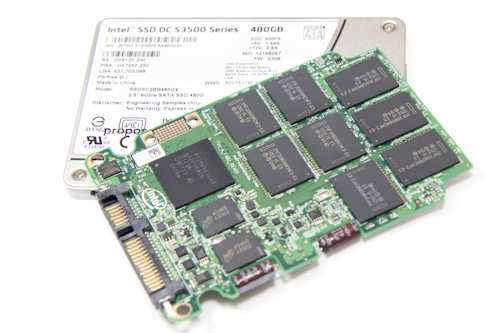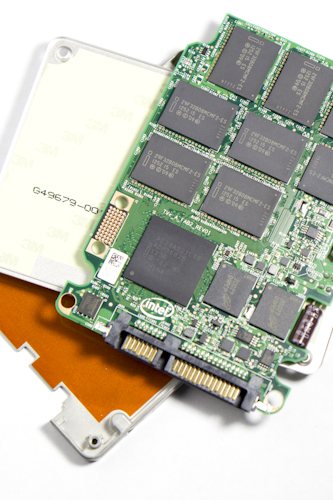The SSD DC S3500 Review: Intel's 6 Gb/s Controller And 20 nm NAND
As enterprise SSDs become more specialized and application-focused, Intel is hoping its SSD DC S3500 will strike a chord with customers looking for excellent read performance on a budget. We compare this drive to other notable contenders in its class.
SSD DC S3500: Not Quite An S3700 Or 600 Pro
On paper and in the lab, Intel's SSD DC S3500 is, hands down, superior to the SSD 320 family it replaces. It's so much better, in fact, that we didn't even include the SSD 320 in our comparison. There are two reasons for this. First, IT professionals buying the SSD 320 today will happily switch to SSD DC 3500s. You get a better SSD from Intel at a 20% discount. That should be an incredibly easy sell. Second, there is just so much competition in the enterprise SSD space today. Nearly every vendor we talk to is coming out with some sort of MLC-based read-oriented drive in 2013. The landscape is changing so quickly that it's difficult to draw a line in the sand and declare a winner (which is what review sites love to do).
It's even hard to make a direct comparison to Seagate's 600 Pro. Seagate ships multiple versions at each capacity point with different amounts of over-provisioning. The 600 Pro we reviewed had three times the over-provisioning as Intel's SSD DC S3500. In random write workloads, the difference is pronounced, even though we know that's not what these drives are meant for.
When you focus on random writes, at the same $/GB, the SSD DC S3500 and 600 Pro are pretty evenly matched. What Seagate gives you is the opportunity to pay a little more for even higher performance. That is something that you don't often see in the SSD space. Typically, performance scales with capacity, not over-provisioning. For a 33% premium, the 600 Pro can deliver two to three times the random write performance of Intel's SSD DC S3500.
Sequential writes also favor the 600 Pro, though in this case it doesn't matter which version you pick. It takes an 800 GB SSD DC S3500 to match the sequential write performance of Seagate's 200 GB 600 Pro. As you go down the line, at matching capacity points, the 600 Pro delivers anywhere from 10 to 100% more sequential write performance. That's impressive.
Enterprise customers shopping for a read-focused SSD probably won't care much about our write benchmarks. In fact, both Intel and Seagate emphasize the read capabilities of their drives. So, let's turn our attention there. In read operations, you get roughly 10% more performance across the board from Seagate's 600 Pro than Intel's SSD DC S3500. There are certain scenarios where the results come closer than that, but, at worst, there is still a discernible difference between both drives.
As much as we wanted to love Intel's new SSD DC S3500, the S3700 set a mighty high bar, and this drive just doesn't measure up. It's not that there's anything inherently wrong with the S3500, but it doesn't out-muscle Seagate's new 600 Pro. That's not to say Intel's latest won't sell well; believe us, it will. So, if you need a very specific capacity or form factor, you'll probably find an SSD DC S3500 able to meet your specifications. For everyone else, there is Seagate's 600 Pro.
Get Tom's Hardware's best news and in-depth reviews, straight to your inbox.
Current page: SSD DC S3500: Not Quite An S3700 Or 600 Pro
Prev Page Results: Enterprise Video Streaming Performance-
Mastle Hi, Think there's an error on page 1, $579 for 80GB drive......Surely won't be getting it at that price for my home build!Reply -
busuan Found myself suddenly losing interests in SATA SSDs after seeing the specs of PCIe SSD in the latest MBA refresh.Reply -
PapaCrazy An Intel 320 series SSD I put in my dad's computer just encountered the 8mb bug even though the firmware was updated with the "fixed" version. He uses the computer for business and I got him an Intel SSD thinking it'd be reliable. I think I'm gonna try Samsung next time around.Reply -
Evolution2001 Nitpicking here... but the article text is still wrong...or the math is. :pReply
''...we do know that the 800 GB model we're reviewing should run around $579. At ~$1.20/GB, ...''
800GB @ $1.20 = $960. -
drewriley Reply10952175 said:Nitpicking here... but the article text is still wrong...or the math is. :p
''...we do know that the 800 GB model we're reviewing should run around $579. At ~$1.20/GB, ...''
800GB @ $1.20 = $960.
Thanks, just can't seem to get the right combination of 4, 8 and 0. The 480GB version is $579 -
drewriley Reply10952165 said:An Intel 320 series SSD I put in my dad's computer just encountered the 8mb bug even though the firmware was updated with the "fixed" version. He uses the computer for business and I got him an Intel SSD thinking it'd be reliable. I think I'm gonna try Samsung next time around.
With the BAD_CTX_13X (8MB) failure, the fixed firmware fixed 'most' of them. The failure rates are quite low, especially after the FW 'fix', but if that one failure happens on the only drive you bought, it can really suck. As a consumer, I could care less if a million other people got a good SSD, if mine fails, I am upset. As an enterprise buyer, if one fails out a million, my company is throwing a party!
-
flong777 Why does Intel continue to release mediocre SSDs? Granted this performs middle of the pack but I just don't understand why a company with Intel's resources doesn't put out a top performer like the 840 Pro.Reply -
Grizely1 Reply10955531 said:Why does Intel continue to release mediocre SSDs? Granted this performs middle of the pack but I just don't understand why a company with Intel's resources doesn't put out a top performer like the 840 Pro.
Go back and read the article.
Or, learn the difference between consumer vs commercial. It's a DT (Data Center). -
flong777 Reply10959572 said:10955531 said:Why does Intel continue to release mediocre SSDs? Granted this performs middle of the pack but I just don't understand why a company with Intel's resources doesn't put out a top performer like the 840 Pro.
Go back and read the article.
Or, learn the difference between consumer vs commercial. It's a DT (Data Center).
Fair enough, I guess I should have been more clear. I don't understand why Intel is involved with so many mediocre SSDs - whether enterprise or consumer.
While I am not an enterprise user, I think I understand the basics. Enterprise SSDs are geared to handle heavy cues and write loads.
You have a point that it is not fair to compare enterprise with consumer - they are two different animals.

